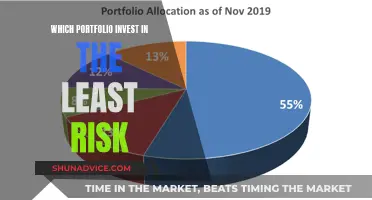
Direct equity investment is a type of investment where an investor directly purchases stocks from a company, receiving every share bought and privileges like voting rights. It is a high-risk strategy compared to equity funds, which are professionally managed and offer more liquidity. Direct equity investments are often made in the form of foreign direct investment (FDI), where the investor seeks to gain controlling interest in a foreign company. This can be done by either opening their own business operations in the foreign country or acquiring control of an existing business's assets. Direct equity investments can also be made in private companies, which is known as Direct Private Investment (DPI). DPIs offer investors the opportunity to make meaningful investments with potentially greater returns, but they also carry additional risks, such as illiquidity.
What You'll Learn

Direct equity vs equity funds
Direct equity investment involves purchasing shares of a company directly on the stock market. This gives the investor voting rights and ownership of every share bought. However, direct equity investment is a riskier option than equity funds, as it is susceptible to high volatility and investors may struggle to sell shares at a fair price.
Equity funds, also known as mutual funds, are professionally managed and invest accrued funds from multiple investors in publicly traded stocks. They are a more stable option due to their ability to diversify across industries and companies, and they offer more liquidity, allowing investors to redeem their investments anytime.
Direct equity investing can be very rewarding, but it requires a profound understanding of market conditions and economic dynamics. It also demands time and attention, as investors need to actively monitor and research stocks. On the other hand, equity funds are ideal for investors who want their investments to be professionally managed and expertly diversified without needing their constant intervention.
Both direct equity and equity funds have their advantages and disadvantages, and the choice between the two depends on the investor's discretion, goals, risk appetite, and available time and capital.
Forex Trading in India: A Beginner's Guide to Investing
You may want to see also

Foreign direct investment
FDI is a significant aspect of international economic integration, fostering stable and long-lasting connections between economies. It is not merely a monetary transfer of ownership but can also include the transfer of technology, organisational and management systems, and other complementary factors. FDI is distinguished from portfolio investment, which involves the purchase of common or preferred stock shares in a foreign company, by the level of control it affords the investor.
There are three general types of FDI: vertical, horizontal, and conglomerate investment. A vertical FDI occurs when an investor adds foreign activities to an existing business, such as an American car manufacturer establishing dealerships in a foreign country. Horizontal FDI involves a company establishing the same business operations in a foreign country as it operates in its home country, like a US-based cellphone provider buying a chain of phone stores in China. Conglomerate FDI occurs when a company invests in a foreign business unrelated to its core operations, often in the form of a joint venture.
FDI can be made in several ways, including opening a subsidiary or associate company in a foreign country, acquiring a controlling interest in an existing foreign company, or through a merger or joint venture with a foreign company. The threshold for establishing a controlling interest through FDI is typically a minimum of 10% ownership, as defined by the Organisation for Economic Co-operation and Development (OECD). However, in some cases, effective control can be established with less than 10% of voting shares.
FDI has benefits for both the recipient country and the investing entity. It can promote economic growth, create jobs, and expand multinational companies' footprints into new markets. However, it also comes with the challenge of navigating the regulations and oversight of multiple governments, leading to increased political risk.
Investing in ADRs: A Guide for Indians
You may want to see also

Risks of direct equity
Direct equity investments carry a higher risk compared to equity funds, which have risk management measures. Here are some of the risks associated with direct equity investments:
Market Risk
Market forces can directly impact stocks, causing them to rise or fall in value. As a result, investors in direct equity may lose some or all of their investment.
Credit Risk
Direct equity investments carry the risk of the company being unable to pay its debts. This could impact the company's ability to meet its obligations and may result in losses for investors.
Foreign Currency Risk
Shifts in the value of international currencies can affect a company's value, especially for those with significant foreign operations or revenue streams.
Liquidity Risk
This risk refers to a company's inability to meet its short-term debt obligations. It can also occur when an investor in direct equity is unable to sell their shares at a fair price or find a buyer, leading to potential losses.
Political Risk
Political changes or instability in a country can negatively impact a company's returns, especially if the business is heavily dependent on government policies or contracts.
Economic Concentration Risk
If a company's value is heavily concentrated in a single entity, sector, or country, any negative impact on that factor can disproportionately hurt the company's value.
Inflation Risk
Rising inflation can dilute a company's value and negatively affect its performance, leading to potential losses for investors.
Management Risk
The ability of a company to manage its finances effectively is crucial. Poor financial management, such as a high equity-debt ratio, can increase the risk of the company not meeting its liabilities and even lead to bankruptcy.
Business Risk
All industries and companies go through cyclical growth phases. A decline in an industry or company's performance can negatively impact the stock price and, consequently, the investor's returns.
Interest Rate Risk
Changes in interest rates during the investment period can affect the price of securities. For example, if interest rates increase, the market value of a bond may decrease, leading to potential losses for investors.
A Guide to Investing in India's Structured Products
You may want to see also

Benefits of direct equity
Direct equity investment involves purchasing shares of a company on the stock market. This type of investment offers several benefits to investors:
Control and Flexibility:
Direct equity investment provides investors with a high level of control and flexibility over their investment choices. Investors can purchase shares directly from the company and own every share bought, along with privileges like voting rights. This allows investors to tailor their investment portfolio to meet their specific needs and financial goals.
Potential for Capital Gains and Dividends:
The primary benefit of direct equity investment is the possibility of increasing the value of the principal amount invested. This comes in the form of capital gains, where the stock price rises, resulting in profits for investors. Additionally, investors can also receive dividends, which are distributions of a company's profits to its shareholders.
Diversification:
Direct equity investments can strengthen an investor's portfolio by adding diversification. By investing in multiple companies across different sectors and industries, investors can reduce their risk exposure and potentially increase their returns.
Avoiding Management Fees:
Direct equity investment eliminates the need for an intermediary, such as a mutual fund or an ETF. As a result, investors can avoid paying ongoing management fees typically associated with fund investing.
Suitability for Sophisticated Investors:
Direct equity investment is particularly attractive to large, sophisticated investors who possess the necessary skills and knowledge to manage individual investments. These investors can make informed decisions about their investment choices, financing methods, and timing, potentially resulting in higher returns.
While direct equity investment offers these benefits, it is important to note that it also carries higher risks compared to equity funds. Investors may struggle to sell their shares at a fair price, depending on market conditions, and it requires a deeper understanding of market dynamics and risk appetite.
JPMorgan's Emerging Manager Program: Investment Opportunities?
You may want to see also

Direct equity vs mutual funds
Direct equity investment involves purchasing shares in a company on the stock market. This can be done through a Demat and trading account, and investors receive voting rights and dividends. Direct equity is a riskier option, as it is prone to volatile price fluctuations. Investors must also have a strong understanding of the market and its dynamics.
Mutual funds, on the other hand, are professionally managed investment funds that pool money from multiple investors to purchase stocks, bonds, or other assets. Mutual funds are considered less risky than direct equity investment due to their diversification and the expertise of fund managers.
Professional Management
Direct equity investment requires investors to have a comprehensive understanding of the market and make their own investment decisions. In contrast, mutual funds are managed by financial experts who decide which assets to buy, sell, or retain based on the fund's objectives. This makes mutual funds more accessible to those who lack the knowledge or time to actively monitor and manage their investments.
Volatility and Risk
Individual stocks tend to be more volatile than mutual funds, which can lead to significant profits or losses for direct equity investors. Mutual funds, by investing in a diversified portfolio of assets, are generally better equipped to handle short-term market fluctuations.
Investment Amount
Direct equity investments can be made with any amount of capital, even purchasing a single share. However, some stocks trade at very high prices, making them inaccessible to small investors. Mutual funds, on the other hand, often have a low minimum investment amount, making them more inclusive for those with limited capital.
Liquidity
Mutual funds offer higher liquidity than direct equity investments. Investors in mutual funds can usually redeem their investments at any time, whereas direct equity investors may struggle to sell their shares at a fair price, depending on market conditions.
Suitability
The choice between direct equity and mutual funds depends on an investor's knowledge, risk tolerance, and available time. Direct equity is suitable for experienced investors with a strong understanding of the market who are willing to take on higher risk. Mutual funds, on the other hand, are a good option for those new to investing or those who prefer a more hands-off approach with lower risk.
Both direct equity and mutual funds offer advantages and provide opportunities for wealth creation. Investors should carefully consider their financial goals, risk appetite, and available capital before deciding which investment avenue to pursue.
Investment Management: PlainsCapital's Offerings and Your Financial Future
You may want to see also
Frequently asked questions
Direct equity investment involves investing directly in the stock market, where the investor receives the company shares. Shares are typically traded on a stock exchange.
Direct equity investment offers the possibility of increasing the value of the principal amount invested, in the form of capital gains and dividends. Direct equity investment also enables investors to directly purchase a stock from a company, along with privileges like voting rights.
Direct equity investment involves higher risk compared to equity funds. Direct equity investors may struggle to sell shares at a fair price depending on market conditions.







